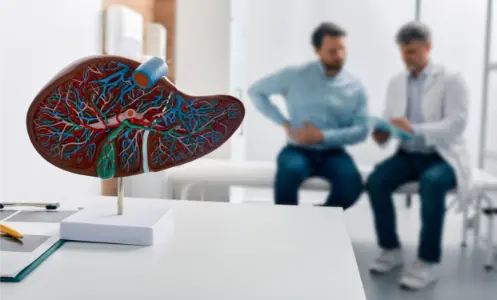Did You Schedule Your Colonoscopy?
As March draws to a close, it’s important to remember that scheduling your colonoscopy shouldn’t wait. March may be almost over, but the opportunity to take charge of your health by booking your screening remains open at any time.
March isn’t just any month; it’s Colon Cancer Awareness Month, dedicated to spotlighting the significance of early detection and prevention methods for colon cancer. Throughout this month, a collective effort is made by various organizations, healthcare providers, and communities to enlighten the public about the risk factors, symptoms, and screening choices associated with this prevalent disease.
By spreading awareness and advocating for individuals to prioritize their well-being through regular screenings and lifestyle adjustments, Colon Cancer Awareness Month serves as a pivotal moment in the global fight against colon cancer, potentially saving countless lives and lessening the burden of this disease worldwide.
Support For IBD - Don't Miss Out!

Understanding Inflammatory Bowel Disease: Symptoms, Causes, and Management
Inflammatory Bowel Disease (IBD) is a term used to describe a group of chronic inflammatory conditions that affect the gastrointestinal tract. It’s a complex and often misunderstood condition that can significantly impact a person’s quality of life. In this blog, we’ll delve into what IBD is, its symptoms, causes, and how it can be managed.
What is IBD?
IBD primarily encompasses two main conditions: Crohn’s disease and ulcerative colitis. While both conditions share some similarities, they also have distinct differences.
Crohn’s Disease: This condition can affect any part of the gastrointestinal tract, from the mouth to the anus. It involves inflammation that extends through the entire thickness of the bowel wall and can cause a range of symptoms, including abdominal pain, diarrhea, fatigue, weight loss, and malnutrition.
Ulcerative Colitis: Unlike Crohn’s disease, which can affect any part of the gastrointestinal tract, ulcerative colitis is limited to the colon and rectum. It causes inflammation and ulcers (sores) to develop in the lining of the colon and rectum, leading to symptoms such as abdominal pain, diarrhea (often with blood or pus), rectal bleeding, and urgency to have a bowel movement.
Symptoms of IBD:
The symptoms of IBD can vary from person to person and may fluctuate over time. Some common symptoms include:
- Persistent diarrhea
- Abdominal pain and cramping
- Rectal bleeding
- Urgency to have a bowel movement
- Fatigue
- Unintended weight loss
- Loss of appetite
- Fever
- Joint pain
- Skin rashes
Causes of IBD:
The exact cause of IBD is still unknown, but it is believed to involve a combination of genetic, environmental, and immune system factors. Certain risk factors may increase the likelihood of developing IBD, including:
- Family history of IBD
- Smoking
- Environmental factors such as diet and exposure to certain infections
- Dysregulation of the immune system
Management of IBD:
While there is currently no cure for IBD, various treatment options are available to help manage symptoms and reduce inflammation. The goals of treatment are to induce and maintain remission, improve quality of life, and prevent complications. Treatment options may include:
Medications: These may include anti-inflammatory drugs, immunosuppressants, biologics, antibiotics, and symptom-relief medications.
Lifestyle modifications: Making dietary changes, managing stress, quitting smoking, and getting regular exercise can help manage symptoms and improve overall health.
Surgery: In some cases, surgery may be necessary to remove damaged portions of the bowel or treat complications such as strictures, fistulas, or colon cancer.
Supportive therapies: These may include nutritional therapy, counseling, and support groups to help cope with the emotional and psychological aspects of living with IBD.
Inflammatory Bowel Disease is a chronic condition that requires lifelong management. By understanding the symptoms, causes, and treatment options available, individuals living with IBD can work with their healthcare providers to develop a personalized treatment plan that effectively manages their symptoms and improves their quality of life. Additionally, raising awareness and advocating for research into better treatment options and a cure for IBD is essential to support those affected by this challenging condition.
The Vital Role of Gastroenterologists in Hepatitis C Care

Hepatitis C, a viral infection affecting the liver, has long been a significant public health concern worldwide. However, thanks to advancements in medical research and treatment options, there’s newfound hope for those affected by this condition. Gastroenterologists, specialized physicians focusing on the digestive system and liver health, play a pivotal role in the management and treatment of Hepatitis C.
Effective Treatments
One of the most remarkable breakthroughs in Hepatitis C care is the development of highly effective treatments that boast an impressive success rate of clearing the infection in more than 90% of individuals. These treatments, known as direct-acting antivirals (DAAs), work by targeting the virus directly, disrupting its replication process, and ultimately eliminating it from the body.
The Role of Gastroenterologists
Gastroenterologists are at the forefront of Hepatitis C care, providing expertise in diagnosing, monitoring, and treating the infection. Their specialized knowledge of the digestive system and liver enables them to offer comprehensive care to patients with Hepatitis C, including:
Diagnosis and Evaluation: Gastroenterologists are skilled in conducting thorough evaluations and diagnostic tests to confirm Hepatitis C infection, assess the extent of liver damage, and determine the most appropriate treatment approach.
Treatment Planning: Based on the individual’s medical history, viral genotype, and liver health, gastroenterologists develop personalized treatment plans tailored to each patient’s needs. They closely monitor treatment progress and adjust therapy as necessary to optimize outcomes.
Monitoring and Follow-Up: Following successful treatment, gastroenterologists continue to monitor patients for any signs of viral relapse or liver complications. Regular follow-up appointments are essential to ensure long-term success and maintain liver health.
Patient Education and Support: Gastroenterologists play a crucial role in educating patients about Hepatitis C, treatment options, and lifestyle modifications to promote liver health. They offer support and guidance throughout the treatment journey, empowering patients to actively participate in their care.
Gastroenterologists are indispensable allies in the fight against Hepatitis C. Their expertise, dedication, and commitment to excellence are instrumental in providing highquality care and achieving successful outcomes for patients affected by this chronic infection. With the advent of highly effective treatments, the landscape of Hepatitis C care has been transformed, offering hope for a future free from this once-debilitating disease.
Vegetarian Sweet Potato & Black Bean Chili

Embrace National Nutrition Month with our hearty and flavorful Vegetarian Sweet Potato & Black Bean Chili!
Ingredients:
2 medium sweet potatoes, peeled and diced
1 tablespoon olive oil
1 onion, diced
3 cloves garlic, minced
1 bell pepper, diced
1 can (15 oz) black beans, drained and rinsed
1 can (14.5 oz) diced tomatoes, undrained
2 cups vegetable broth
2 teaspoons chili powder
1 teaspoon cumin
1/2 teaspoon paprika
Salt and pepper to taste
Optional toppings: diced avocado, chopped cilantro, sour cream, shredded cheese, lime wedges
Instructions:
- In a large pot or Dutch oven, heat olive oil over medium heat.
- Add diced onion and minced garlic, sauté until softened and fragrant, about 2-3 minutes. Add diced bell pepper and diced sweet potatoes to the pot, cook for another 5 minutes until vegetables start to soften.
- Stir in black beans, diced tomatoes (with their juices), vegetable broth, chili powder, cumin, paprika, salt, and pepper. Mix well to combine.
- Bring the chili to a boil, then reduce heat to low, cover, and let it simmer for about 20-25 minutes, or until sweet potatoes are tender and the flavors have melded together.
- Once the chili is cooked, taste for seasoning and adjust if necessary.
- Serve the Vegetarian Sweet Potato & Black Bean Chili hot, garnished with your favorite toppings such as diced avocado, chopped cilantro, sour cream, shredded cheese, and a squeeze of lime juice
Warm up with a bowl of this comforting chili, packed with nutritious ingredients and delicious flavors! Perfect for a satisfying meal any day of the week.


